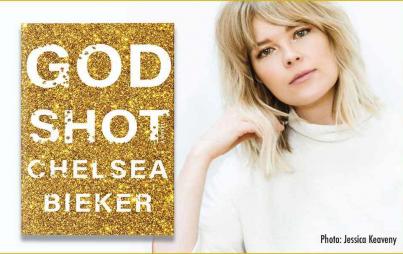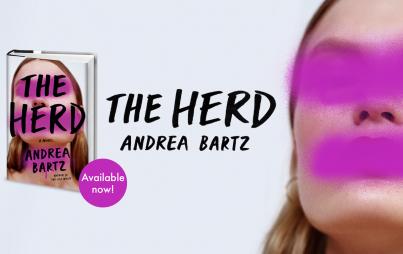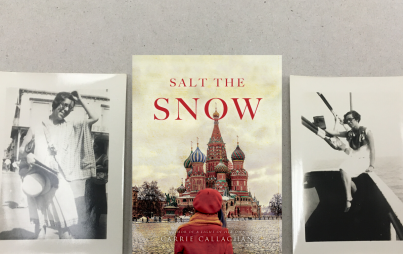
Photo courtesy of Melissa Broder
You’ve probably already retweeted her and didn’t even know it. Melissa Broder started off as the anonymous @SoSadToday, tweeting relatable musings of the depressed, such as: “unless you've walked a mile in my prozac don't tell me what to do” while publishing poetry under her real name. The tweets turned into essays, which turned into a book, which turned into Melissa revealing herself and giving up the safe confines of anonymity. Her twitter account made people feel less alone and broke down some of the stigmas we still have today.
I sat down with her to discuss her debut novel: The Pisces. The Pisces follows a depressed Lucy who suffers a breakup that halts her dissertation. She flees to Venice Beach, dog sitting for her sister and aiming to fill a void with Tinder hookups. Then she meets a strange “swimmer” who’s actually a real-life Merman. How can love work out between sea creature and human? How can love work with anyone at all?
I meet Melissa in a small back room of the Uptown Underground Theatre. She greets me with a big smile, clad in a black leather jacket with a diet coke in hand. When asked how the book tour is going, she says she’s seen a lot of hotel rooms and a lot of 7/11’s. “They’re my safe space,” she says.
She tells me she used a blind price deal to book a hotel for her and her husband on the last leg of the book tour. Of course, she doesn’t get the generic Holiday Inn that she wants, she gets a hotel that’s rumored to be haunted. This is normally right up her alley. “If I weren’t coming from a book tour, I’d be totally down for a haunting. But I’m like, I want room service, not a haunting. You know? It might be The Shining. We’ll see.”
A lot of writers start with autobiographical fiction. You did personal essays right before this book. What I want to know is how you approach creating characters and plot, and if you steal from real life?
I say my characters are all composites. Lucy definitely is half me. The protagonist. (She pauses, laughs). Ok, so she’s, like, a lot of me. It was so funny because the other day someone was reading it and she's like, “are you sure that this part about not wanting to have babies is really not you?” and I was like, “no Linda it's all fiction…” but, like, is she crazy??? Of course, it's me! I'm just throwing my own shit in there. But it's like Alchemy; you know what I'm saying?
Alchemy, I've always felt is the magic of poetry. Like, you'll just be working on a poem, and you're not sure where it's going to go, and you will encounter, somewhere, something... something in the world, and it's like, “oh!” Or I’ll read something, and it's like “oh, that's the direction.” I sort of discovered that fiction can be like that, too. There's also a magic that happens where it's like, you come up with this idea – like this germ – and then all of a sudden a book just comes into your life that guides it, or the people you already know. And some of the characters are inspired by people I have met, but they're all composites. I didn't just rip someone from real life.
Tell me about reading The Professor and the Siren (Giuseppe Tomasi di Lampedusa) as that magic moment.
I was reading that book on the beach and was like, wow, the Siren figure really captures everything I’ve been trying to put in a poem but felt like I was writing the same poems again. After I finished So Sad Today, I was like, “shit…” What if I could...what if I wrote a novel? And I was like, no I can’t write a novel. And then I thought, well maybe if I just dictate like three paragraphs...
What was the process through the dictation?
After I've done my dictating — it translates from Siri to Simplenote — I just have a block of text. And I never go back during the writing; I just keep going. So even if a sentence is completely wrong, I just keep going. I don't correct anything. And then when I'm done with the first draft, like when I reach the end, thousands and thousands and thousands of words later, then I start the editorial process.
And the first round of edits is literally just trying to figure out what I was trying to say. There’s autocorrect, and there are whole sentences that I’m like, “I have no idea what the fuck this was.” So I just rewrite it entirely. But that's really the first round of edits, which I think a normal writer wouldn't have. But at the same time, I think I'm faster in the draft than another writer because I'm not stopping along the way.
As a poet, I love brevity. I've always wondered why you would say in 200 Pages what you could say in two. So, creating that much clay and that much bulk to even start shaping the story is like the scariest part for me. It was with the essays, and it was with the fiction, and I'm working on two more novels right now, and it's still...you know, the editorial part isn't quite as scary.
Do you still see yourself as a poet more than anything else?
I don't know. I'm like one of those Russian dolls with the layers or whatever, and I think that the inside is the poet, and I also think that the outside is a poet, but maybe there are other layers in between that are different things. I feel like I do have the soul of a poet, and for a long time, I only thought I was a poet. But I’m like, “oh, there are other things in here!” But I'm pretty sure when you get to the last doll, it's also a poet.
Did you notice a change in the cadence of your voice and your syntax when using voice dictation?
Sometimes. Sometimes it was just me slogging through my three paragraphs. I'm like, fuck, it's the end of the day, and I haven't done it. And I'm neurotic, so I won't be able to go to bed unless I've done it. And then sometimes, I'm driving on the 405 and dictating a particularly passioned part, and I'm, like, in it, and I'm hammin’ it up.
Was there a time where it’s the end of the day, and you haven’t dictated, so you have to get back in your car…
Oh, I don't just have to do it in my car! I can do it other places, but I prefer not to do it with anyone else — I don't do it with anyone else around. Like, I'll have to close myself in a room. One time I was staying at my sister's apartment in San Francisco, and it was raining, and I went to go get takeout for us, and I was like, “fuck, I haven't done it yet.” And so, on the street, I just did it in the pouring rain. (Laughs) It doesn't have to be in my car, that was just how it began. But I don't like to do it sitting down at a desk, you know? And I have to be alone, cause that's fuckin’ weird. I can't be near anyone I know. Like if I'm on the street and strangers are passing by, that's fine, cause they just think you're talking on your phone. And it’s LA…there’s plenty more weird than I.
Let’s talk about creative voice. Do you find that you have a different voice for poetry, essays, and now fiction? And how did you find that voice or are you still finding it?
I don't think you can teach it. You just help people to let go and find it. For poetry, I really don't like to use any words that are contemporary. I don't like brand names in my poems; I don't want any corporate crap. I want it to be almost like every word you could have understood 500 years ago. Then with the essays, I'm like, totally down to talk about Cheesecake Factory.
With the prose, it's sort of a Hybrid, you know? Just in terms of language constraints, I feel much more precious about the poems. So Sad Today ...I mean Cheesecake Factory was in there like, eight times, I think. When I went from writing poems on the subway to dictating, it was like my language became a lot more conversational, so I think I allowed myself that.
I think my poetry is not as humorous. My first book of poems, When you say one thing but mean your mother, was trying to be funny — I don't know if it was — and I hate that book. I'm like, this is a disgusting piece of trash. But in my current work, in the prose and stuff, I'm like “I'll be funny…” I don't know what it is about poetry, but it's like, the longer I've been writing poetry, the more stripped-down and essential I want to get. I want to wear as few masks as possible. I want to almost channel it; whereas, if you write a whole novel where you're just channeling it, people are going to be like, “I'm not reading this garbage.”
It's going to be too dense.
Right, and I think the art is in how to shape it without being too put on. Like how to still have that authenticity but also create a narrative that people will want to read. I think with poems — certainly, you can do whatever you want — but my theory is that you have to teach the reader how to live in that world. Even if it's just a 10 line, 10-word poem, you set up a world within that poem and teach the reader how to live there, and then you can do whatever you want. I guess the same could be true of prose, but I feel like with prose we have a lot less patience.
How do you handle self-censorship?
I don't. I don't censor at all, especially for my first draft. Later in the edits, I'm like “do we really need to include this?” But that's part of the reason for the dictation is because it just allows me to not let that inner critic say, “well, maybe…” I've given myself full permission to make all of the mistakes. Like, I want to make the mistakes. That's why even when it writes down a character's name wrong I don't correct it because I'm like no! Not that I'm going to end up using the wrong name, but there's just something about this process of not fixing anything. I
t's supposed to be wrong; it's supposed to be messy, you know? That's literally the mindset that I have to use because I'm such a perfectionist that otherwise I would never finish a first draft. So I'm like, no, let it be a big fat mess. A sculptor has the clay, and then they sculpt the clay. But our clay is our words, so we have to, like, get the words.
You have to create the clay!
Right, you make the clay! And I don't like — well, it's not that I don't like making the clay, but making the clay is the part that gives me the biggest terror. That, and if an editor wants to make huge changes but I don't have precise instruction on how to do it, it kind of feels like I'm going in and doing major surgery with no map. I'm so used to poetry, and it's all line edits. But there were parts to this book where I'd start moving around chunks. It's one thing if it's like, “okay move this here and move this here,” but if it's like, “this isn't really working.” I'm like, where do you move ‘em? So I tried to put everything into a list as much as I could and crossing it off. The more I could possibly make it obsessively minute, I did.
Your book is called The Pisces, but I read that you’re kind of over astrology. How do you feel about it?
I'm kind of like, astrology is bullshit, and I totally wouldn't use it. But at the same time, if my friend who is a Cancer tells me they're dating a Libra, I'm going to be like, oooooh (grimaces). So, yes, I'm done with it, but it’s so ingrained in me that I'm never going to get rid of it, you know?








